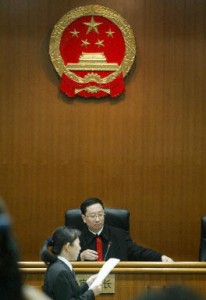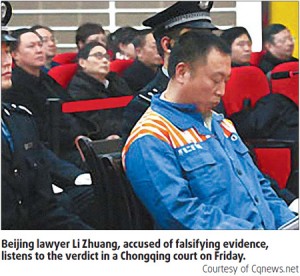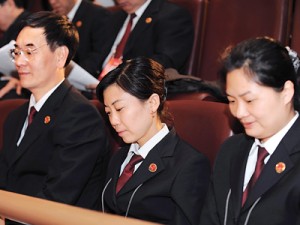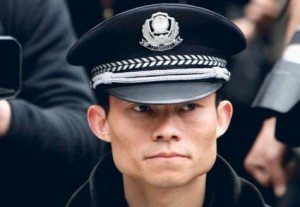China’s New Rules on Illegally-Obtained Evidence – Finally Published But Less than Expected
 In our June 2, 2010 post – “A Paper Tiger?” – we discussed China’s newly adopted “Regulations on the Exclusion of Illegally Obtained Evidence in Criminal Cases.” At that time, the Regulations were not publicly available and we based our analysis on a summary of the regulations published in the state-run media by Prof. Fan Chongyi, a noted criminal procedure expert at the China University of Politics and Law.
In our June 2, 2010 post – “A Paper Tiger?” – we discussed China’s newly adopted “Regulations on the Exclusion of Illegally Obtained Evidence in Criminal Cases.” At that time, the Regulations were not publicly available and we based our analysis on a summary of the regulations published in the state-run media by Prof. Fan Chongyi, a noted criminal procedure expert at the China University of Politics and Law.
Last week, the Chinese government finally publicly issued the “Regulations on the Exclusion of Illegally Obtained Evidence in Criminal Cases” (English translation courtesy of DuiHua Foundation; Chinese version here). These Regulations do not portray the sophistication found in Prof. Fan’s analysis, showing that perhaps Chinese legal academia is more progressive and more committed to legal reform than the Chinese government. This shouldn’t be surprising. In order for these Regulations to really have an impact, it was necessary to bring on board China’s Ministry of Public Security (MPS) and Ministry of State Security (MSS), two police bodies that, as in most cultures, are inherently conservative and do not like their investigative powers reined in by the law. While the Regulations are a step forward, it is a bit disappointing that they do not go as far as we had originally hoped.
In addition to some of the issues noted in our previous post, the Regulations raise some of the following issues:
- Will a Chinese court ever conduct an investigatory hearing as to the legality of the confession? Articles 6 and 7 of the Regulations govern the burden of proof when raising the issue of a confession gained through torture. Similar to the law in the U.S., under the Regulations, the defense has the right to raise the issue of a confession obtained through torture but must offer a sufficient factual basis for the court to order a hearing on the matter. Similarly, the Chinese regulations places a minimum burden on the defense to offer some factual basis for its claim; Article 6 calls for the defense to provide the name of the person who performed the torture, the time the torture occurred, the place, the manner and the content of the torture in order for the court to call for further investigation. If the defense can offer that minimal evidence, the court assumes that the confession was obtained illegally and the burden of proof switches to the prosecutor to offer evidence or testimony that the confession was obtained legally as required by Article 7.
But Article 6 and 7 provide no standards for the evidence. For the defense, Article 6 requires that some “leads” or “evidence” be provided to the court. While the Article 6 offers some examples of what the leads or evidence could be, does the defense have to provide all of those examples? If so, how would a defendant know the names of his interrogators? There isn’t necessarily a polite introduction aspect to an interrogation. Will a defendant, after a few rounds of torture, even remember the time and the place of the torture? Likely the few pieces of evidence a defendant would be able to offer is the manner and content of the torture. But it is unclear if just those two pieces of evidence would be sufficient for the court to switch the burden of proof to the prosecutor.
If the court does happen to order a shift in the burden of proof, Article 7 is similarly silent on the sufficiency of  evidence a prosecutor needs to provide to show that the confession was gained legally. In fact, Article 7 is even less clear on what that evidence should be offered and provides little guidance as to what a judge should consider and the weight of any evidence. Would a court find a signed statement from one of the interrogators stating that there was no torture enough evidence? Article 7 does state that audio and video recordings could be sufficient, but does not mandate this type of evidence. If Article 7 had mandated that the prosecutor provide video or audio evidence of the interrogation, then the Regulations would be a huge step forward in preventing torture during an interrogation. Perhaps in practice courts will de facto require such evidence, giving more bite to the Regulations. But nothing in the Regulations themselves currently mandate video or audio evidence.
evidence a prosecutor needs to provide to show that the confession was gained legally. In fact, Article 7 is even less clear on what that evidence should be offered and provides little guidance as to what a judge should consider and the weight of any evidence. Would a court find a signed statement from one of the interrogators stating that there was no torture enough evidence? Article 7 does state that audio and video recordings could be sufficient, but does not mandate this type of evidence. If Article 7 had mandated that the prosecutor provide video or audio evidence of the interrogation, then the Regulations would be a huge step forward in preventing torture during an interrogation. Perhaps in practice courts will de facto require such evidence, giving more bite to the Regulations. But nothing in the Regulations themselves currently mandate video or audio evidence.
- Is a prosecutor able to delay the trial indefinitely? Interestingly, Article 7 also offers the prosecutor the opportunity to postpone the trial so that he or she can obtain more evidence to show that the confession was obtained legally. In accordance with the Regulations, the prosecutor would request a postponement under the Article 165 of the Criminal Procedure Law (CPL). However, Article 165 of the CPL contemplates three different situations in which a trial could be delayed, two of which are applicable in a case where a prosecutor needs more evidence to prove the legality of a confession: (1) the need to notify a new witness to appear in court or to obtain new physical evidence and (2) when the public prosecutor discovers there is a need to conduct a supplementary investigation. Only the latter situation contains a one-month time restriction (see CPL Article 166); postponement due to the need to notify witnesses or obtain new physical evidence does not have a time restriction. While CPL Article 165(2) seems most applicable to situations where a prosecutor requests more time to obtain evidence to show that a confession was obtained legally, a court could postpone a trial on the grounds found in CPL Article 165(1), especially if the court is pressured by the Chinese Communist Party, through an adjudication committee, to give the prosecutor more time to obtain enough evidence to convict. Until courts have greater independence, expect outside influence in politically-important cases. Articles 8 and 9 of the Regulations also allow a postponement in the trial for further investigation: Article 8 is at the request of the court and Article 9 is at the request of the prosecutor during the trial. Neither Article 8 nor Article 9 reference any portion of the CPL which would limit the time of the postponement. In fact, the language in Article 9 is very closely aligned with the language found in CPL Article 165(1), which does not limit the time length or the postponement.
- Does the appeals process offer greater protection from illegally-obtained confessions? Article 12 contemplates an appeal process and creates an incentive for the defense to raise the issue of an illegally-obtained confession at trial. Under Article 12, if the defense alleges that the defendant’s confession was obtained through torture, the court refuses to investigate the allegation, and the court uses the confession as a basis for a conviction, then on the appeal – or what is known in China as the “trial in the second instance” and the court retries the case – the appellate court must conduct an investigation. This appears similar to the U.S. system of raising an objection on the trial level in order to “preserve” the issue for appeal. But looking more closely at Article 12, a lot more elements are required to preserve the objection. In the U.S., filing a motion to suppress evidence or merely objecting to an issue at trial, even if overruled, is enough to preserve the issue for appeal and if properly preserved, the appellate court must re-examine the trial court’s decision. But in China, under Article 12, it’s not enough that the issue is raised and overruled, the confession must also be a basis of a conviction to require the court of the second instance (the appellate court) to investigate the circumstances surrounding the confession.
 In addition to using the confession as a basis of the defendant’s conviction, the court of the first instance must also have rejected the defense’s request to conduct an investigation; in other words, the court must have found the evidence provided by the defense under Article 6 of the Regulations insufficient to switch the burden of proof to the prosecutor and conduct an investigation under Article 7 of the Regulations. But if the court in the first instance conducts the investigation and finds that the prosecutor offered enough evidence to rebut the defense’s allegation, on appeal, the court in the second instance is not required to re-investigate the issue of the legality of the defendant’s confession. Given the loosey-goosey parameters of the evidence required of the prosecutor under Article 7, the trial finding the prosecutor’s evidence sufficient is likely.
In addition to using the confession as a basis of the defendant’s conviction, the court of the first instance must also have rejected the defense’s request to conduct an investigation; in other words, the court must have found the evidence provided by the defense under Article 6 of the Regulations insufficient to switch the burden of proof to the prosecutor and conduct an investigation under Article 7 of the Regulations. But if the court in the first instance conducts the investigation and finds that the prosecutor offered enough evidence to rebut the defense’s allegation, on appeal, the court in the second instance is not required to re-investigate the issue of the legality of the defendant’s confession. Given the loosey-goosey parameters of the evidence required of the prosecutor under Article 7, the trial finding the prosecutor’s evidence sufficient is likely.
Article 12 mandates that court of the second instance conduct an investigation if the three elements found in Article 12 are met. But there is nothing in Article 12 that forbids the court of the second instance to investigate the allegations of illegality if less than all three of the elements of Article 12 are present; there is just nothing that requires it. In fact, CPL Article 186 gives the appellate court the power to reexamine all issues in a case, even if outside the scope of the appeal or protest. So ultimately, it is within the power of the court in the second instance to conduct an investigation concerning a defendant’s confession, regardless of the elements of Article 12.
- What about cases outside of the formal criminal justice system? Flora Sapio, an expert in Chinese criminal law, noted in her analysis of the new regulations that the Regulations apply only to formal criminal cases; the Regulations offer no protection to individuals in criminal-like situations, such as Re-Education Through Labor (RETL) and drug rehabilitation, both administrative cases, not criminal ones. The new regulations offer no protection to individuals being tried in these areas of law.
The “Regulations on the Exclusion of Illegally Obtained Evidence in Criminal Cases” were drafted in order to better implement the Chinese Criminal Law’s prohibition against torture of suspects. But ironically, the Regulations themselves are relatively vague and their strength will only be determined through their implementation. If defense counsel does not raise the issue of an illegally-obtained confession (with CL Article 306 defense counsel has the incentive not to protest the confession as discussed in the previous post), or if the court does not give greater life to Articles 6, 7 and 12, then the Regulations will have little impact. But given that there are some in the legal field that are working hard to provide for greater justice and rule of law in the Chinese criminal justice system, there is hope that perhaps something can happen with these Regulations. A small hope, but hope nonetheless.
 On Facebook
On Facebook By Email
By Email 





